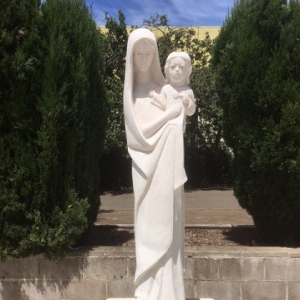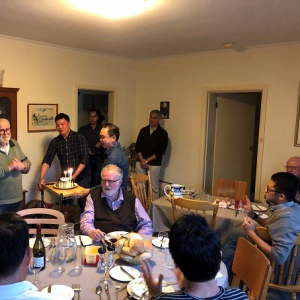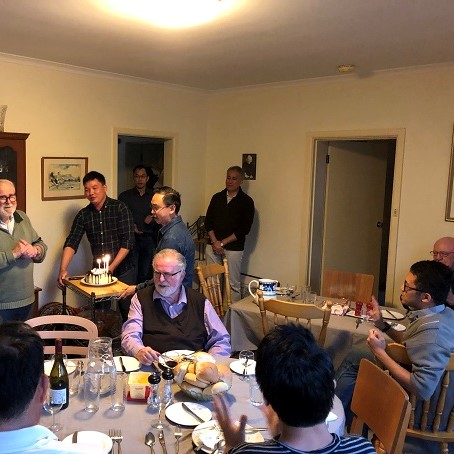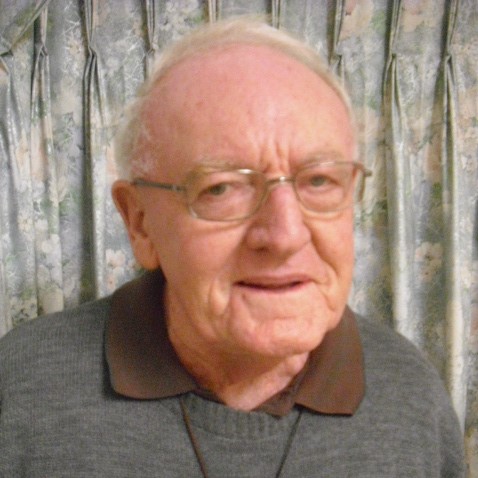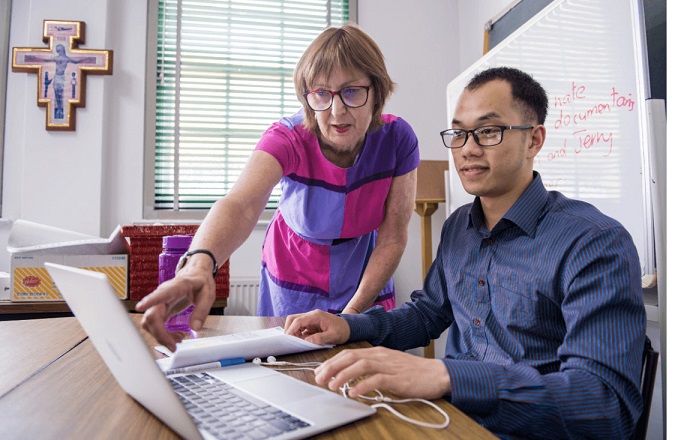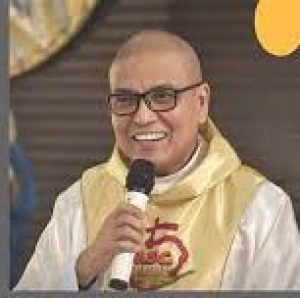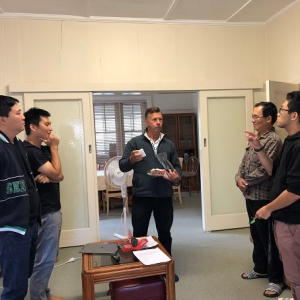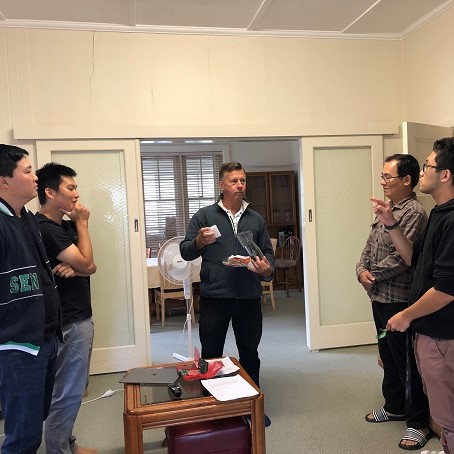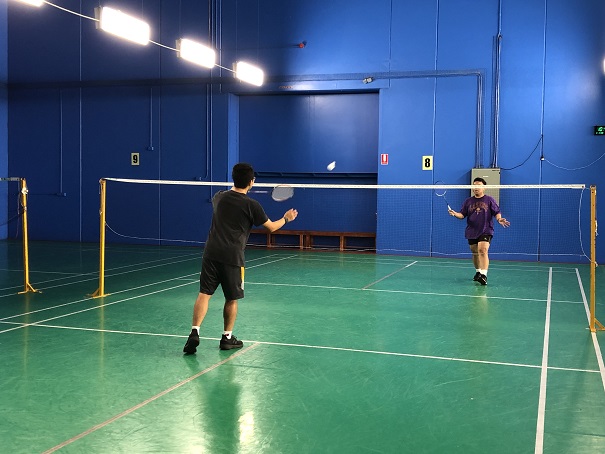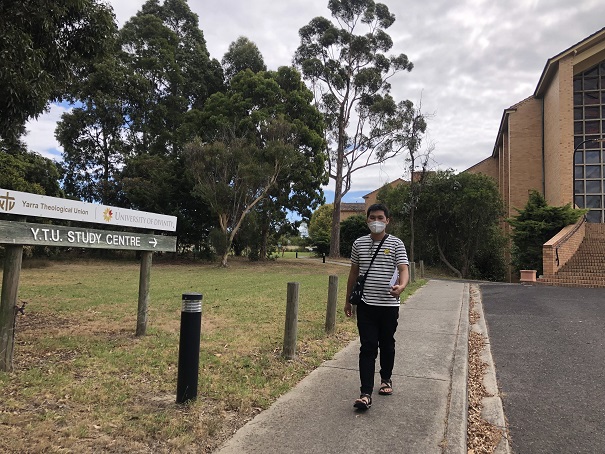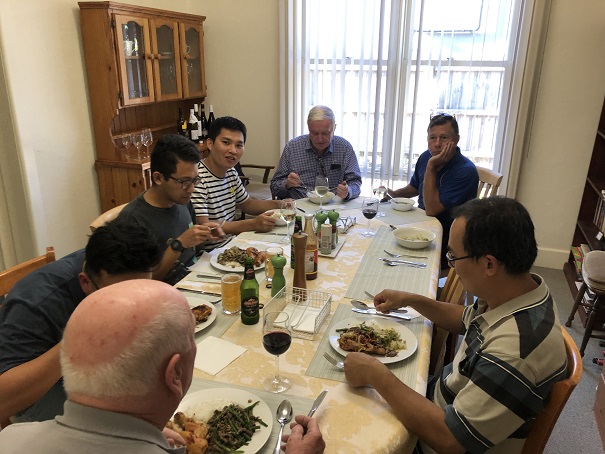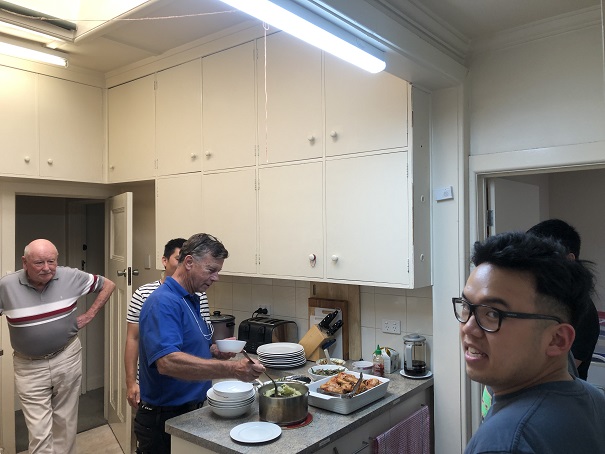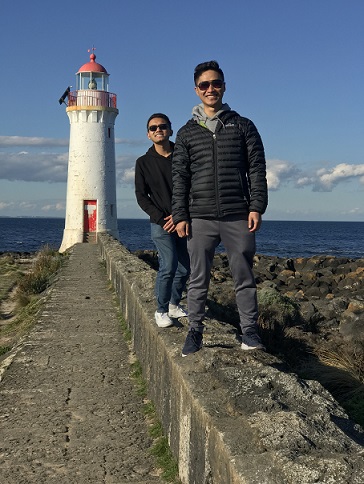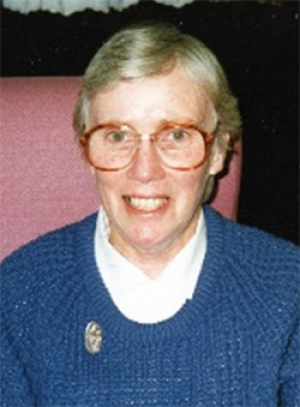Peter MALONE
Chevalier College, new OLSH statue, where and how
Chevalier College, new OLSH statue, where and how
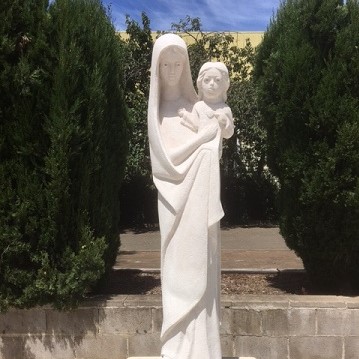
John Mulrooney writes:
Please find a picture of our new statue of Our Lady of the Sacred Heart ‘enthroned’ in a new garden area at Chevalier College.
There is quite a lot of work yet to be done in the garden: tiling on the wall behind; greenery etc etc. A massive amount of turf has been laid in the garden this week.
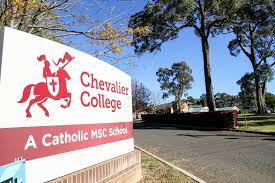
Last year we revamped the garden in front of the school Chapel and moved the statue of the Sacred Heart from the front of Riversdale Chapel to a more prominent place in the school. We will call this garden the ‘Sacre Coeur Courtyard’ and the garden where OLSH has been established will be called ‘Notre Dame Courtyard’. Already we have seen students taking photos of the statue and also standing next to it. It brings with it an icon representing the feminine in the divine.
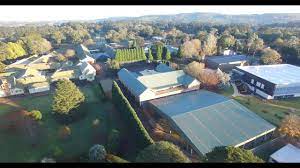
The statue is made of marble dust and cement and created by an artist in Byron Bay. I worked closely with him to ensure it was based on the statue in the courtyard at Issoudun and he understood the basics of the spirituality of OLSH. He has done a very fine job. There she will stand for another hundred years.

MSC Australian 2022, Who? Where? Victoria-Tasmania Community
MSC Australian 2022, Who? Where? The Victoria- Tasmania Community.
Gathering yesterday evening at Kew, Krish and Kenji visiting
And showing reverence and respect for Age, in Age order!
Ted McCormack, Monivae, Supply
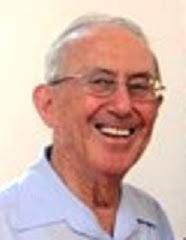
Paul Castley, Kew, Supply
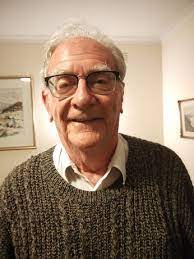
Michael Sims, Little Sisters of the Poor, Northcote
Brian Gallagher, Blackburn, retired

Peter Malone, Kew, Heart of Life, Media
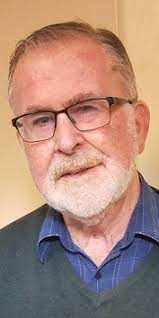
Philip Malone, Kew, Community Leader
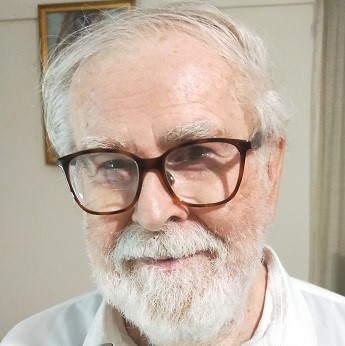
Frank Andersen, Mont Albert
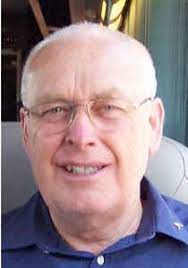
Peter Curry, Kew community
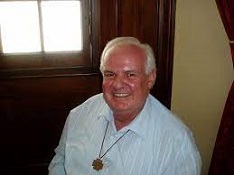
Des Holm, Kings Meadow, PP
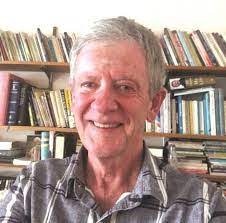
Mark Hanns, Cuskelly House, Blackburn, Formation Director
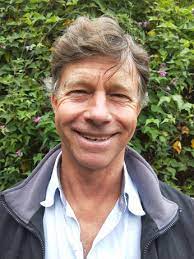
Alo Lamere, Blackburn, PP
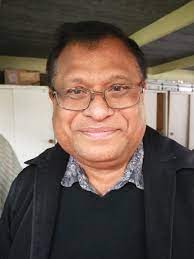
Vincent Phan, Cuskelly House, Blackburn, YTU Studies

Krish Mathavan, Moonah, PP
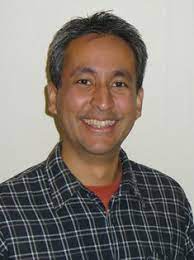
Khoi Nguyen, Naughton House, Blackburn, HOL Siloam
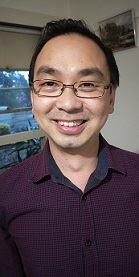
Hoa Tran, Cuskelly House, Blackburn, YTU Studies
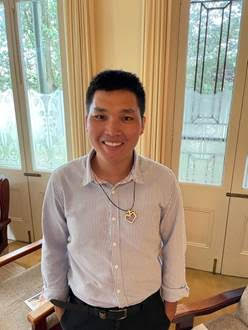
Trieu Nguyen, Cuskelly House, YTU Studies
Daniel Magadia, Cuskelly House, YTU Studies
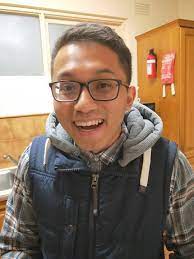
And Long who studied English by Zoom last year, now at Cuskelly House for English studies.
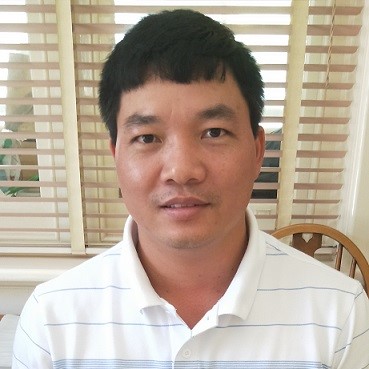
MSC Philippines, Justice, Politics and a coming election
MSC Philippines, Justice, Politics and a coming election
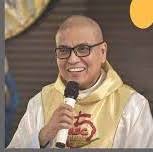
Fr Bogey Cabrera MSC, Provincial Superior
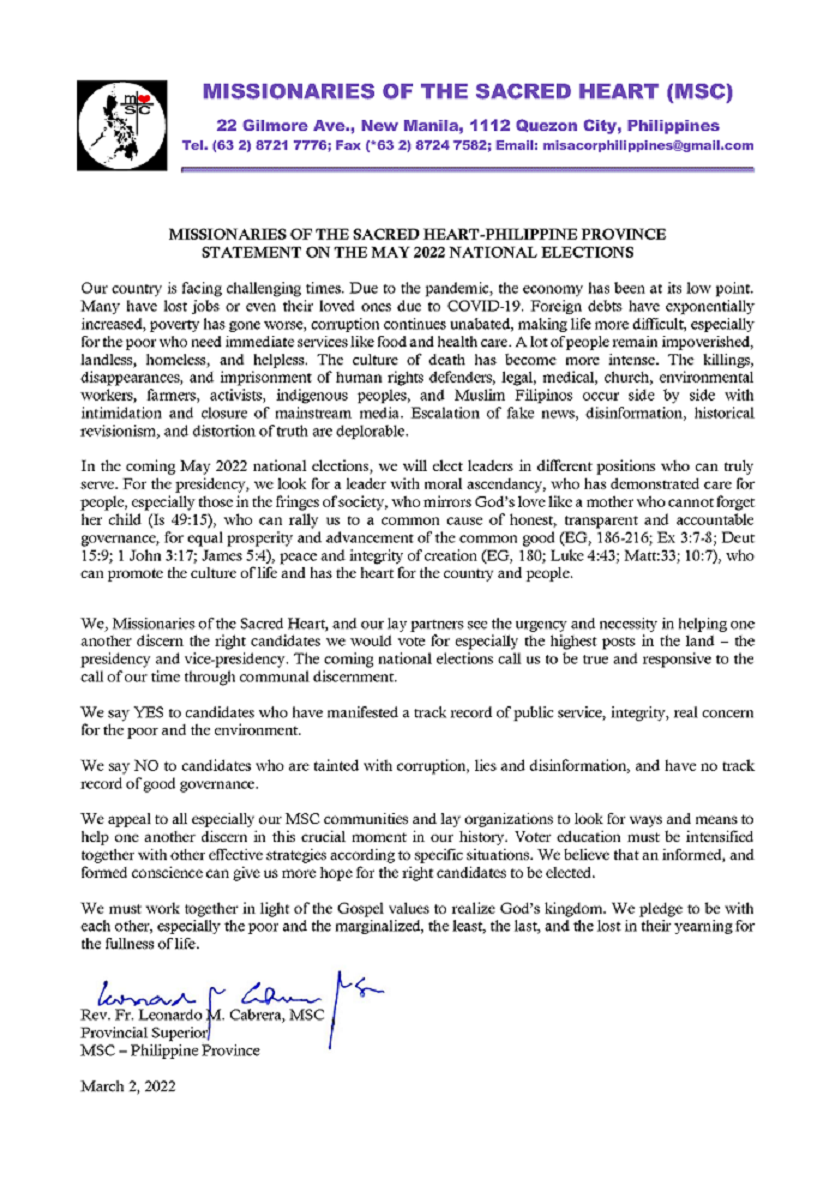
Life at Cuskelly House getting under way for 2022
Life at Cuskelly House getting under way for 2022
Living at Cuskelly House, Professed, Daniel, Trieu, Vincent and Hua. Studying English at YTU, Long. Student director, Mark Hanns.
(We realise that the photos can be momentarily misleading because it is Trieu out of the picture behind the camera – see him below on an escapade with Daniel.)
The sporting life
The studies – and some face-to-face beyond Zoom
Meals, and a visit from Bob Irwin and neighbour, Brian Gallagher.
And, of course, the washup.
And Trieu, our photographer.
RIP, Sister Gertrude Mary OLSH
RIP, Sister Gertrude Mary OLSH
We offer our condolences to our OLSH Sisters

I need nothing but God, and to lose myself in the heart of God - Margaret Mary Alacoque
These words from St Margaret Mary Alacoque capture well the driving force behind our dear Sister Gertrude Mary’s life. Deep faith in the one who called her and loved her unconditionally. At approximately 3.15pm on Wednesday, 16 February, our dear Sister, Gertrude Mary came face to face with the one she had lovingly and generously served for over six decades as a Daughter of Our Lady of the Sacred Heart.
To Gertrude Mary’s sister Monica, and all her relatives and friends who loved her so much and are deeply saddened by her death, we offer our deep sympathy and love. We also offer sympathy to those who join us via livestreaming from around the world and throughout Australia, especially our Sisters.
Gert, as we called her, was born Margaret Mary Kennedy, in Sydney, on 4th May 1933 to John and Gertrude Mary, the eldest of three children. When Gert was about two years old, the family moved to Grafton where she lived until she entered our Congregation. Gert’s father was a commercial traveller and bookkeeper. Her mother was musical and belonged to the Bankers Operatic Society. Gert’s love of music and the theatre began at a young age when her mother took her to symphony concerts and movies. The family had a strong Irish Catholic faith, with love of the Mass and rosary. Her mother’s deep devotion to frequent communion overflowed onto Gertrude Mary.

Gertrude Mary attended Primary and Secondary School at St Mary’s College, Grafton. After completing her studies, she attended Library School at the Public Library of NSW, qualifying with a Preliminary Certificate of Librarianship and was employed by Grafton City Council as a librarian at the city library.
When growing up, Gertrude Mary said she was always; “reading, reading, reading”. She wrote, “When the library came to Grafton, I forced my younger sister to join so that I could borrow books from the children’s library”. This was how she became interested in librarianship.
Gert loved dancing and a highlight of her secondary schooling was that she learnt dancing and she was allowed to attend the school ball at Woodlawn College in Lismore which her brother attended. She was very happy that Peter repeated a year and so she was able to go twice to the Ball!
While working at the Library, Gert borrowed a book called; The Nun: Saint Margaret Mary and the Sacred Heart by Margaret Trouncer. She was struck by the life of St Margaret Mary and by her devotion to the Sacred Heart. She also read missionary stories in The Annals and Harvest magazines at home and read every pamphlet available when she went on Children of Mary retreats.

After working for six years and with quite a full social life, going to dances and playing tennis, she recalled “It became very strong in my mind that I had to do something about this vocation business”. She wrote to Kensington and was then in contact with Mother Concepta. On 31st May 1956 she commenced her initial formation at Hartzer Park.
Gertrude Mary made her first Vows on 6th January 1958 and then began her long life as a secondary school teacher, in Kensington, Bentleigh and Enfield. Having completed her BA and Dip Ed she taught French and Latin, as well as English, Maths, Geography and History.

She was an excellent teacher who was greatly appreciated by her pupils and their parents. When contacted about her death the immediate response from her former students was one of praise, commenting that Sr Gertrude Mary was an excellent teacher, had great knowledge about a wide range of subjects, was approachable, always kind and caring. Even though Gert was very clever she was unassuming and self-effacing and never pushed herself forward. Later Sr Gertrude Mary was responsible for school administration both as deputy and as principal. In these positions she took great interest in the education and welfare of the girls in the schools and cared for the staff. Gert had a genuine love for her students and their families. She kept in touch with many of her students after they finished school and when they visited her, she showed a great interest in them and their families.

In 1990 when doing an Italian course in Adelaide, Gert applied and won a scholarship to study Italian for a month in Perugia, Northern Italy. In 1994 Gert moved to Bowral for two years. Here she interviewed sisters for their life stories. She assisted at the Catholic Education Office when living at Daceyville from 1996 to 2001. Once again, she found herself doing what she loved, being a librarian for the Primary Schools in the Eastern Region. Gertrude Mary acquired many skills in her training for and lived experience as a librarian. These remained very much part of Gert's personality: she was a diligent researcher, an avid reader and a careful notetaker with a scholarly approach to research. She was moreover very obliging in sharing her information. As one Sister commented; ‘rather than make the effort to look up a point of knowledge often I would just ask Gert a name, the title of a book, an event or a date and I wasn't the only one who did this; she was not only accurate but very gracious in her responses’.
In 2002 moved Gertrude Mary to Maristella community Kensington. Here one of her main ministries was part-time receptionist at St Joseph’s Aged Care Facility. As Gertrude Mary’s health was failing, in 2011 she joined the community of St Joseph’s at our aged care facility, where she was beautifully cared for until her death. In her early years as a resident at St Joseph’s she showed obvious delight from visits by the Sisters and others and she could entertain them for ages with stories of all that had happened since their last visit.
Sr Gertrude Mary was an unassuming beautiful person, a woman of deep faith and practical concern for others and a valued friend and colleague to many.
We thank God for the many gifts given to Sr Gertrude Mary, we thank the Kennedy family for their gift of her to our religious family.
We thank you Gert for your interest in us, your gentle presence and your endearing smile. May your humble soul now rest in peace.
International award for Australian Catholics film reviewer
International award for Australian Catholics film reviewer
The work of Australian Catholics film reviewer Peter Malone was honoured at the recent International Catholic Film Critics Association (ICFCA) awards.
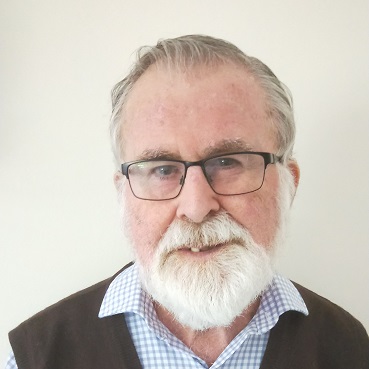
From the Australian Catholics website: Fr Peter took out the Honour for Outstanding Criticism (ICFCA member) section. Other nominees included John Mulderig, Catholic News Service’s associate director for media reviews and Joseph McAleer, a CNS freelance movie critic.
‘It was an honour and a pleasure to be named for the award,’ Fr Peter said.
Fr Peter sees himself less as a film critic or academic, and more as a mediator between films and the readers of his reviews.
‘I highlight what is interesting and finding ways of alerting to aspects which may cause difficulties in viewing.’
He said a couple of years ago, American Catholic reviewer Michael Augsberger set up an association of Catholic reviewers, which included a site for reviews and other features from a Catholic perspective. Fr Peter, along with fellow Australian reviewers Peter Sheehan, Callum Ryan and Richard Leonard, became part of the association.

The value of such an association these days was contact and communication, and an opportunity for sharing views, as well as maintaining an international perspective, Fr Peter said.
‘It’s always interesting to discover different emphases on the Catholic perspective, from explicit affirmation to more ecumenical, interfaith and intercultural dialogue,’ Fr Peter said.
A prolific reviewer (few movies escape his scrutiny as you will see from the Australian Catholics Film Reviews website), Fr Peter prefers movies that involve human drama, though he is ‘partial to murder mysteries’.
And his favourite film? 2001: A Space Odyssey.

The ICFCA named Coda Best Picture and awarded Belfast the Human and Gospel Values Award. For more information on the winners of the 2021 Catholic Film Critics Awards, see the association website.
Looks that Kill
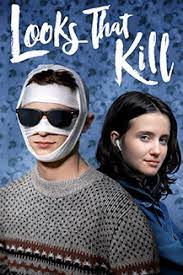
LOOKS THAT KILL
US, 2020, 92 minutes, Colour.
Brendan Flynn, Annie Mumolo, Peter Scolari, Ki Hong Lee, Julia Goldani Telles, Monique Kim.
Directed by Kellen Moore.
Looks that kill is to be taken literally in this film. While it is a romantic comedy, it has an extraordinary premiss that a young man, even from the moment of his birth, when looked at, those who look dropped dead. He has a lethal attraction!
He lives a reclusive life, home-school, only one friend who visits. He keeps his face bandaged. At the opening, his defied by a psychologist – who looks on his face and drops dead.
The friend tries to take the young man out of himself, arranging of date which is a fiasco, an experience of a bully. However, by chance, he comes across a young woman who has a heart condition and they bond, visiting a home for aged care, befriending the elderly ladies there.
It is an up and down relationship, the young man conscious of his situation she offers. Ultimately, they bond. In the background is his caring mother, his computer games preoccupied father and the taking in of a Korean foreign student, surly presence in the house.
There is a sad ending with the young woman dying. There is a somewhat vindictive ending as the bully challenges the young masked man – and the bully drops dead!
- The black comedy premise? Fantasy?
- The American town, homes, restaurants, hospitals, psychologist’s rooms, aged care homes? The musical score?
- The title, the presupposition, Max at birth, the death of the hospital staff, interview with the psychologist, his death? Keeping his face bandaged? Homeschooling? Not going out? Friendship with Dan, at home, computer games, Dan wanting him to go out, arranging the date, the reaction of the girl, and the confrontation with the bully?
- Max’s character, pleasant, the encounter with Alex, her personality, revelation about her heart condition, going to the aged care home, meeting the old ladies, playing cards? The return and the welcome?
- Max, the attraction to Alex, contacts, her keeping away, his following her, the bus stop? The continued friendship, confidences?
- At the hospital, Alex and her mother?
- The bond between the two, visiting the aged care home?
- The buildup to Alex’s illness, information about her death?
- Max at home, his relationship with his parents, devoted mother, his father distracted with the computer games? The decision to have the Korean student?
- The Korean student, her manner, strength, shopping, throwing the boxes away, surly?
- Dan and Max, the bully coming to the door, the challenge, Max unmasking, the bully collapsing and dying?
- A wry romantic comedy, the premise, impossibility, audiences accepting the premise?
Book of Love/ 2022
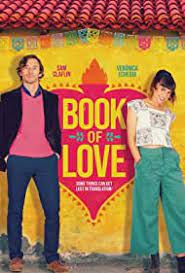
BOOK OF LOVE
UK/Mexico, 2022, 106 minutes, Colour.
Sam Claflin, Veronica Echequi, Fernando Bercerill, Ruy Gaytan, Horacio Villalobos, Horacio Garcia Rojas, Lucy Punch.
Directed by Anileine y Mayor.
What would happen if a serious novel about love, rather abstract and philosophical, not selling at all in the UK, was translated into Spanish and reached the Mexican bestseller list? It’s ominous title is The Sensible Heart. We would want to know why – and, the answer is that the translator spiced it up (understatement) and omitted the boring parts! And what would happen to the serious novelist on discovering what had happened – and being sent by the publishers on a Mexican tour?
And the answers to these questions are what we see and sharing.
The basic premise is rather obvious and predictable – and, rather one-note. However, the screenplay unfolds in a way that perhaps we might have written that had we been commissioned. Which means that we probably like it. It is lighthearted – lightheaded. It is an amusement not to be taken too seriously.
Sam Claflin plays the hapless novelist, Henry Copper (always confused with Cooper). He has taken some years to write his novel, rather introspective, the theories of love in his head rather than from experience. No wonder the few people at his novel reading walk out and the booksellers “get three when you buy one”!
Henry is rather overwhelmed by Jen, the ultra-exuberant opportunist publicist, played with verve by Lucy Punch.
So, off to Mexico and who knows what! He is whisked from the airport by the translator, Maria (Veronica Echequi), her grandfather and her little son, chaperones for her travel. (She actually has a husband who is hopeless, turns up now and again, jealous of her.) And, almost immediately, Henry is whisked again to press conference with absolutely adoring fans, men and women.
(This reviewer happened to see Lady Boss, the Jackie Collins Story at the same time as Book of Love – some remarkably similar sequences and experiences, fans, TV interviews, the high life, except that this is all that Jackie Collins wrote and hoped for!).
We know was where this is all going, especially if we were to write it ourselves. Henry will mellow. Maria will be always in charge, dominating Henry. They will be urged to write another novel together which leads to clashes, interventions by Maria’s husband, Henry disappointed. But, a nice ending with her son. There will also be a sequence where they walk and talk together, being honest with each other, she challenging about his isolation and inexperience, he succumbing in love.
Of course there is a happy ending (absurd to think otherwise!), Maria’s husband makes a fool of himself intervening at a press conference, Maria comes to the rescue with translating again as Henry returns to Mexico.
What happens, he explains the fans, is that Maria in re-writing novel “re-wrote his life. It could be called The Emotionalisation of Henry Copper.
- The title? The Sensible Heart? The second book, Double Hearts?
- The London settings, the views of London, Henry’s flat, the publisher’s offices, streets and surroundings? The musical score?
- The Mexican settings, the cities, the vistas, the countryside, travelling, the range of countrysides?
- Henry Copper, his novel, taking years to write, the reading, people leaving, summoned by the publisher, her enthusiasm, the information about the Mexican translation, bestseller, the plan for him to go to Mexico?
- The flight, Henry arriving in Mexico, Maria and her son and her grandfather, his seeing the cover of the book, lurid? The big poster? His being bewildered?
- The meeting, the fans, the enthusiasm, with the books, the implications of the sexy novel? The questions, Maria translating, the reaction of the fans? Her bluntness, leaving, his bewilderment?
- Henry as a man, sheltered life, prim English, theoretical about love? His reaction to the discoveries about the translation, the changing of characters, omissions, Maria’s decisions? The publisher and her calls, continued enthusiasm? Signing autographs?
- Travelling the countryside, the further meetings? Henry going on social media, the range of messages, photos, Twitter remarks…? His bewilderment?
- The encounter with Pedro, gay style, flair, insistence on the promotion of the book? Wanting another book? The couple staying with him?
- The further meetings, the continued fans?
- On the road, getting to know Maria better, the clashes with her? The boy, clash with his mother, Henry going to communicate with him, bring him back, the photo?
- Maria’s husband, abandoning her, his mates, jealousies, the encounters with Maria, arguments, taking the photo with him in bed, sending it to Henry?
- The couple trying to work together, creating a new story? The basics? The background, their talking together, Maria and her ambitions, working in the bar, not having time to write? Henry, some concessions to Maria? The walk together, talking, self revelation, the sexual encounter and the consequences?
- Henry, jealousy at the photo, not believing Maria? Back to London, the publication of the book? The return to Mexico, the press conference, the fans all present again, Maria arriving with her son? Her doing the translation? Her husband intruding, the defiance, the clash, his humiliation?
- The interview, talking of the rewriting of the book – and Maria rewriting Henry’s life?
Weekend Away, The
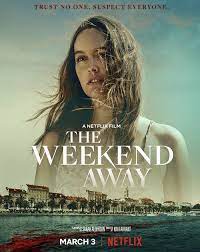
THE WEEKEND AWAY
US, 2022, 90 minutes, Colour.
Leighton Meester, Christina Wolfe, Ziad Bakri, Luke Norris.
Directed by Kim Farrant.
This is an easy-going murder mystery, a screenplay written by Sarah Henderson from her novel, light reading for airports and flights. It is a Netflix entertainment.
Two friends plan a holiday weekend in Croatia, with some filming in Split, making the city very interesting and attractive, quite a tourist did.
Leighton Meister plays the more sedate friend, married with a child, coming across from London to be with her friend, Kate (Christina Wolfe), highly outgoing. After an enjoyable meal, Kate insists they go clubbing which results in drinking, drinks being drugged, attempted robbery, escort’s going back to the hotel, Kate’s disappearance until, ultimately, she is found floating in the sea.
At the beginning, Beth has befriended the taxi driver, Zain (Ziad Bakri), a refugee from Syria. She begins to rely on him to help her with the search for Kate and her frustrations with the police, especially the police chief who arrogantly dismisses her claims.
Gradually, there are quite a number of suspects, including the manager of the hotel where the guests stayed, who has an elaborate surveillance system and is in contact with the police. Beth is suspected of the murder, interrogated. And the stories told about Zain having criminal connections with the Albanians in the city. Beth has made many phone calls to her husband who turns up in Split. And she has to inform Kate’s former husband, a businessman in London, about her disappearance and then death.
With some tension, pressure on Beth, help from Zain, and a sympathetic female police investigator, there is a climax, a chase, confrontation with the police chief who, it turns out, has shady connections and a past record of attacks on women.
The solution to the mystery occurs 15 minutes before the end of the film – and impatient audiences need to stay on and watch the rest because there is a complete twist and a different explanation as to who killed Kate.
Direction is by Kim Farrant and, Australian director of Strangerland and Angel of Mine.
Wakefield
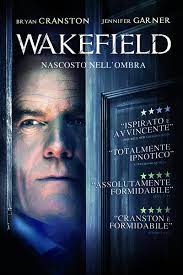
WAKEFIELD
US, 2017, 106 minutes, Colour.
Bryan Cranston, Jennifer Garner, Beverly D'Angelo, Jason O'Mara.
Directed by Robin Swicord.
Wakefield is based on a short story by the celebrated novelist, E.L Doctorow, best known for Ragtime. The writer-director is Robin Swicord who has a long history of screenwriting, Little Women, as well as directing the Jane Austen Club.
The film offers the opportunity for a tour-de-force performance from Bryan Cranston, emerging from his success on television in the series, Breaking Bad. And, at this time, he appeared as Lyndon Johnson in All the Way as well as the blacklisted writer, Dalton Trumbo, in Trumbo.
Cranston is Howard Wakefield, who works in Manhattan, is seen at the rail station, travelling home to the suburbs when his train experiences blackout and the passengers have to walk to their destination. When he arrives at his home, in the night, Wakefield does not go in, rather goes up to the upper story of the garage and, ultimately, decides not to go into the house but to stay away. Basically this is the story of Wakefield staying away, although there are quite a number of flashbacks to his relationship with his wife, Diana, Jennifer Garner, their meeting, courtship, his betrayal of her friend, her pregnancy, the birth of twins, the jealousy games that they began to play and the effect on each of them. Wakefield has not been a particularly strong presence to his daughters in their teens.
The film uses the device of strong voice-over by Wakefield, describing what is happening, describing his thoughts, feelings, hesitations, decisions, consequences. He stays in the flat, observing through the windows, hiding himself. Eventually, hair growing long, long beard, going out and looking like the homeless people in the streets, scavenging in rubbish bins for food and anything else, he gets into a way of life.
When his wife and children go on a summer vacation, taken by his wife’s mother whom he loathes, he ventures out, sitting in the park, being offered a dollar by a kind little boy, enjoying a burger. He also encounters some of the disadvantaged children who gather at his next door neighbours, especially Herbert, living with Down Syndrome, and Emily, who are kind to Howard, bringing food, comfort him during the winter, but demanding their silence.
Ultimately, Howard has to make a decision, whether to walk away completely, whether to stay in the garage, or return to what he was a year earlier, haircut, shaving, driving to New York, buying proper clothes, going back to his workplace. Eventually, he stands at the door of the house, debating, and eventually going in, the film ending, leaving it for the audience to speculate as to what would happen.
- The title, blunt, the focus on Howard Wakefield? His story?
- Based on a short story by E.L, Doctorow?
- New York State, the opening, the rail station, the spectacular foyer, the crowds? The train journey? The blackout, walking along the tracks? The suburbs, homes, woods, the garage, interiors? Interiors of the home? The town, the streets, rubbish bins, parks, shops? The musical score?
- Audience response to Howard Wakefield, Bryan Cranston’s screen presence and career, busy at the railway station, New York work, briefcase, in the train, the tracks, not going into the house, going to the garage, the upper room, the windows, watching his wife and daughters?
- The voice-over, the inner life of Howard Wakefield, decisions, motivations, lack of decision? His option for staying in the garage, continuing there? The possibility of returning? His comments about himself, about his wife, memories of their meeting, her dancing, friendship with Dirk, his attraction, betrayal of Dirk, Dirk hitting him, marrying Diana, her pregnancy, the twins, their growing up, his being a father, an absent father? His judgements about himself, his excuses?
- The decision to stay in the garage, his managing, going to the house, the food, time passing, hair and beard growing, scrounging in the rubbish for food, for all kinds of possessions? No explanation about his laundry? Scavenging books and reading, the radio, the absence of news, television? What was happening to him?
- Diana, her personality, dancing, her theories about the body, exposure, her daughters? The initial relationship with Dirk, then with Howard? The years of marriage? Howard’s explanation about the games, jealousy, the flashbacks, the interactions, the sexual encounters, the effect on Howard, the effect on Diana over the years?
- Diana, Howard absent, the visit of the police, her mother coming in, Howard’s disdain of her? The later gathering of people, Howard’s suspicions? His continuing to observe? Her behaviour over the months, the twins, their age, interactions, going to school?
- Howard observing the neighbours, Herbert living with Down Syndrome, Emily, Emily watching him? The later encounter with them, friendship, conversation, the helping him, food? The coming to the attic, Howard’s comment about Portia’s speech from The Merchant of Venice, Mercy? Secrecy? Their leaving?
- Howard, the time passing, the encounter with the homeless in the street, the Russian group, fighting for food, chases? Looking at himself in the mirror after Emily looked at herself? His image of himself?
- The family going for their holiday, with Diana’s mother, the danger of his being discovered, concealing himself? The return?
- The winter, cold, the help from Emily and Herbert? Taking stock of himself?
- The special meal, the guest, Howard coming out, discovering it was Dirk?
- The decision to come out of himself, haircut, shave, driving the car, the shops in New York, the new clothes, able to go back to work?
- Returning, outside, decision to go into the house or not, going in? The film ending? Leaving it to audience speculation?
